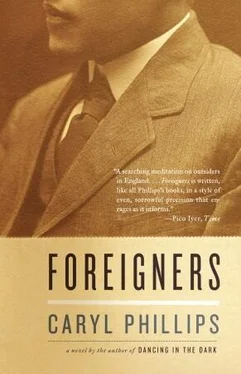Lionel stood out in Warwick, for there were no other coloured people in the town, and he was regularly referred to as 'Sam', which was an abbreviation for the more pejorative 'Sambo'. He was equally exotic in nearby Leamington Spa, where the introverted West Indian veteran soon met a local teenager named Beatrice Whitehouse. Beatrice came from a rough, but tight-knit, local working-class family, her father being well known in the area as a bare-knuckle prizefighter who plied his trade at the local Woolpack Inn. Lionel wasted little time in proposing to Beatrice, and although times were hard for everybody, they settled down and tried to raise their mixed-race family in a social atmosphere that was not always friendly or supportive. Later in life, Jackie Turpin remembered that 'there was a time when nobody would cross the road to speak to the Turpins. We was just little black kids as used to run around Wathen Road and Parkes Street.' However, Beatrice prided herself on having come from tough stock, so nothing was going to deter her from protecting and supporting her children, who were often taunted as being 'dirty' or 'khaki-coloured'. Sadly, as the family grew, Lionel's condition began to deteriorate, and it became increasingly difficult for him to hold down a job. He moved back and forth between the family's Leamington home and a hospital in nearby Coventry, until it was clear that the coloured veteran required fulltime care and attention. He was eventually allocated a bed at the Ministry of Pensions Hospital in Birmingham, but on 6 March, 1929, nine months after the birth of Randolph, his fifth child, Lionel Fitzherbert Turpin finally passed away due to war injuries that he had suffered over a decade earlier. His funeral hearse was drawn by four black horses, with six soldiers as an escort, and the thirty-three-year-old former military man was buried in the Brunswick Street Cemetery, Leamington Spa, in a ceremony that was paid for by the Leamington branch of the British Legion.
At the age of twenty-five, Beatrice was left by herself to bring up five children: Dick, Joan, Jackie, Kathy, and Randy. She was entitled to a widow's pension of just under thirty shillings a week, which she could supplement with whatever she might earn cooking and cleaning for other people, but however hard she tried Beatrice could not make ends meet. As a result, she often sent her children to stay with different relatives; Dick frequently went to stay with his grandmother, while Joan spent time in Wales with her aunt. However, when circumstances allowed, Mrs Turpin would bring all of her children back together under one roof, but life was never easy for Beattie, and young Randy was particularly worrisome to her. As a three-year-old boy, Randy had contracted double pneumonia and bronchitis, and although he eventually recovered the diseases returned on two further occasions. On their final appearance, the doctor told Beattie that she should prepare herself for Randy's death, but she chose instead to sit up all night with her youngest child, sponging him down to keep his temperature under control, and feeding him to keep up his strength. Much to the doctor's surprise, and the family's relief, little Randy survived, and this served only to make Beattie all the more determined to keep her children together. She once again retrieved them from the relatives among whom they had been distributed and, having now decided to marry a local English man, in 1931 she permanently reunited her household.
As a child, Turpin earned the nickname 'Licker', a moniker that he would carry with him into adulthood and beyond. Although most people assumed that the 'Leamington Licker' was so called because of his ability to beat, or 'lick', his opponents, according to his brother Jackie, the name had nothing to do with his fighting prowess. Randy, Jackie, and sister Joan were all born in June, on the 7th, 13th, and 19th respectively, and when the birthdays arrived young Randy used to assume that because his birthday came first that made him the oldest. Apparently, Joan would shake her head and insist that he was, in fact, the littlest, to which he would shout that he wasn't the 'lickerest' he was the oldest. Sister Joan would mimic his pronunciation, telling him that he was just a 'licker boy' and if he didn't behave himself she would spank his bottom. The fiery Randy would inevitably rush at his sister with his fists flying, insisting that he wasn't a 'licker boy', and the family pet name stuck and became eerily appropriate for a boy who would eventually grow up to become a champion boxer.
Randy was not an easy child for his mother, his siblings, or eventually anybody to deal with. Headstrong and capricious, his family struggled to both protect him and avoid his occasional outbursts of anger. With so many children to cope with it was difficult for young Beattie to exercise any real discipline, and it was particularly perplexing for her to know how to handle her youngest child towards whom she felt a special affection. To make matters worse, while swimming in a river young Randy was trapped by weeds and his hearing was permanently damaged. He was, for the rest of his life, very much aware of his partial deafness, but he did not like to dwell upon it and would become upset if it was mentioned. However, he was a fearless child, and was always ready to attack no matter how big or implausible the opponent. Young Randy Turpin was quite prepared to strike out with just his fists, but if there happened to be a weapon to hand then he would happily seize it. He once chased his eldest brother Dick with an axe, threatening to 'chop his bleeding head off ', but his weapon of choice was usually a knife. In one argument he actually stabbed his brother Dick, and despite Beattie's pleading with him to calm down it was clear to everybody that this child might well be on a collision course with trouble.
When he was five, Randy began to attend West Gate Council School, which was both understaffed and overcrowded. It was a school that was designed to provide precious little in the way of academic opportunities, being merely a place to hold working-class children until they could be processed out at the age of fifteen and enter the workforce. By the time Randy was twelve, the athletically gifted 'Licker' could beat any boy in the school with his fists, or with his feet. He paid little, if any, attention to his schoolwork, preferring to pour his energies into developing his well-earned reputation as both a sportsman and a 'tough nut'. He and his followers would 'persuade' boys to hand over money or sweets, and while his friends held their victim's arms 'Licker' would teach the poor lads a lesson by giving them a good pummelling. At home, his siblings were not spared his attentions. Joan remembers, 'He blackened my eyes for me twice. Once for my birthday, and once for telling my granny tales about him.' Sister Kathy recalls, 'If you didn't do what he wanted he'd clank you for it. He'd squeal to my mother if you hit him back and if you did anything he didn't like he came in and smashed all my dolls. I had some black celluloid dolls and he'd put his foot in them and break them.'
To some of the townsfolk of Leamington Spa, young 'Licker' Turpin was a bully whose mother clearly had no control over him. There were those who would not dare to make eye contact with him in the street, or even in the semi-darkness of the cinema, and nobody wanted to be in a shop when 'Licker' came in and demanded that you buy him something. Any challenge to his 'authority' might well be met with a torrent of verbal abuse, and it was also possible that the unfortunate person would be given a good kicking for their trouble. Many believed that being from the only coloured family in the town obviously informed the boy's delinquency. It did not occur to them that being the only coloured family in town meant that the Turpins, Randy included, had to be able to take care of themselves, and sometimes get their retaliation in first. In the thirties, most British people were unfamiliar with the novelty of living among people of another race, but given the evidence of the Turpin family, the novelty of living with coloured people was something that a number of the more narrow-minded townsfolk of Leamington Spa had concluded that they could do without.
Читать дальше











![Unknown - [Carly Phillips] The Bachelor (The Chandler Brothe(Bookos.org) (1)](/books/174132/unknown-carly-phillips-the-bachelor-the-chandle-thumb.webp)
